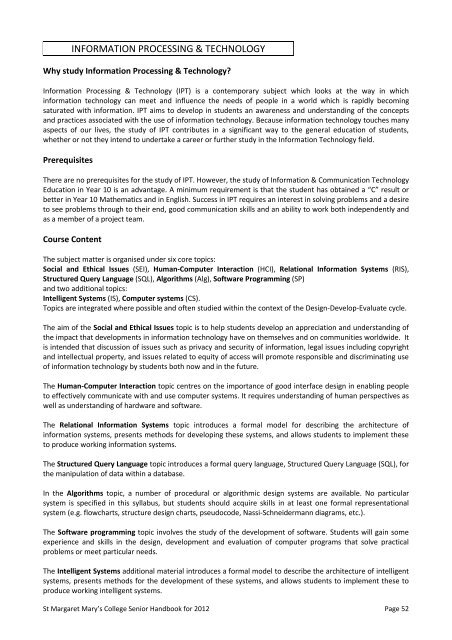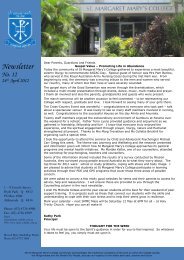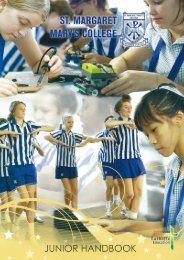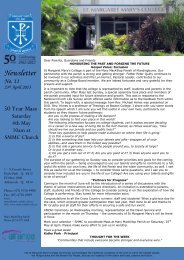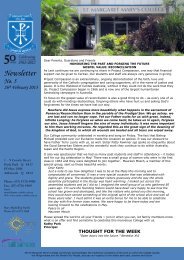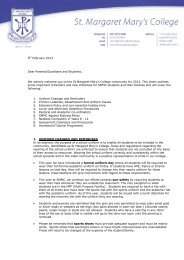SENIOR HANDBOOK for 2012
PRINCIPAL'S MESSAGE - St Margaret Mary's College
PRINCIPAL'S MESSAGE - St Margaret Mary's College
- No tags were found...
Create successful ePaper yourself
Turn your PDF publications into a flip-book with our unique Google optimized e-Paper software.
INFORMATION PROCESSING & TECHNOLOGY<br />
Why study In<strong>for</strong>mation Processing & Technology?<br />
In<strong>for</strong>mation Processing & Technology (IPT) is a contemporary subject which looks at the way in which<br />
in<strong>for</strong>mation technology can meet and influence the needs of people in a world which is rapidly becoming<br />
saturated with in<strong>for</strong>mation. IPT aims to develop in students an awareness and understanding of the concepts<br />
and practices associated with the use of in<strong>for</strong>mation technology. Because in<strong>for</strong>mation technology touches many<br />
aspects of our lives, the study of IPT contributes in a significant way to the general education of students,<br />
whether or not they intend to undertake a career or further study in the In<strong>for</strong>mation Technology field.<br />
Prerequisites<br />
There are no prerequisites <strong>for</strong> the study of IPT. However, the study of In<strong>for</strong>mation & Communication Technology<br />
Education in Year 10 is an advantage. A minimum requirement is that the student has obtained a “C” result or<br />
better in Year 10 Mathematics and in English. Success in IPT requires an interest in solving problems and a desire<br />
to see problems through to their end, good communication skills and an ability to work both independently and<br />
as a member of a project team.<br />
Course Content<br />
The subject matter is organised under six core topics:<br />
Social and Ethical Issues (SEI), Human-Computer Interaction (HCI), Relational In<strong>for</strong>mation Systems (RIS),<br />
Structured Query Language (SQL), Algorithms (Alg), Software Programming (SP)<br />
and two additional topics:<br />
Intelligent Systems (IS), Computer systems (CS).<br />
Topics are integrated where possible and often studied within the context of the Design-Develop-Evaluate cycle.<br />
The aim of the Social and Ethical Issues topic is to help students develop an appreciation and understanding of<br />
the impact that developments in in<strong>for</strong>mation technology have on themselves and on communities worldwide. It<br />
is intended that discussion of issues such as privacy and security of in<strong>for</strong>mation, legal issues including copyright<br />
and intellectual property, and issues related to equity of access will promote responsible and discriminating use<br />
of in<strong>for</strong>mation technology by students both now and in the future.<br />
The Human-Computer Interaction topic centres on the importance of good interface design in enabling people<br />
to effectively communicate with and use computer systems. It requires understanding of human perspectives as<br />
well as understanding of hardware and software.<br />
The Relational In<strong>for</strong>mation Systems topic introduces a <strong>for</strong>mal model <strong>for</strong> describing the architecture of<br />
in<strong>for</strong>mation systems, presents methods <strong>for</strong> developing these systems, and allows students to implement these<br />
to produce working in<strong>for</strong>mation systems.<br />
The Structured Query Language topic introduces a <strong>for</strong>mal query language, Structured Query Language (SQL), <strong>for</strong><br />
the manipulation of data within a database.<br />
In the Algorithms topic, a number of procedural or algorithmic design systems are available. No particular<br />
system is specified in this syllabus, but students should acquire skills in at least one <strong>for</strong>mal representational<br />
system (e.g. flowcharts, structure design charts, pseudocode, Nassi-Schneidermann diagrams, etc.).<br />
The Software programming topic involves the study of the development of software. Students will gain some<br />
experience and skills in the design, development and evaluation of computer programs that solve practical<br />
problems or meet particular needs.<br />
The Intelligent Systems additional material introduces a <strong>for</strong>mal model to describe the architecture of intelligent<br />
systems, presents methods <strong>for</strong> the development of these systems, and allows students to implement these to<br />
produce working intelligent systems.<br />
St Margaret Mary’s College Senior Handbook <strong>for</strong> <strong>2012</strong> Page 52


